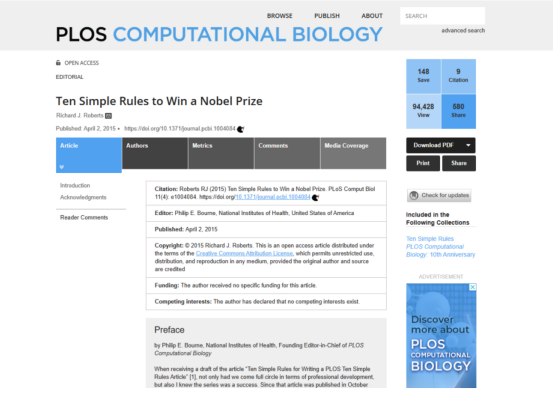Please click the button below to go to our email login page
|
“Ten Simple Rules” to Win a Nobel Prize from a Nobel Prize laureate Studying biology can increase the odds of winning a Nobel Prize by 50%This article was written by Richard John Roberts, the winner of the 1993 Nobel Prize for Physiology or Medicine and a biochemist from England.
Initially, he was reluctant to receive the invitation by the editor-in-chief, because he felt insulting for a truth-seeking scientist to write an article guiding people on how to achieve “success”. Roberts thought that scientists should not be encouraged to do research for awards, and their devotion and curiosity should be the source of the best achievements and breakthroughs. However, Roberts wrote this article anyway, and made a point of not focusing solely on winning awards while showcasing his unique wit and humor.
1. Never start your career by aiming for a Nobel Prize, but focus on doing the very best science that you can. 2. Hope that your experiments fail occasionally. The failure often results from a lack of carefulness or a faulty theory. If you are lucky to be in the latter condition, you may stumble onto something valuable enough to be prizeworthy. 3. Collaborate with other scientists, but never with more than two other people. There can only be three winners on the ticket for a Nobel Prize, so pick your collaborators carefully. 4. To increase your odds of winning, be sure to “pick” your family carefully. The survey revealed that currently seven children of Nobel Prize winners have gone on to win the Prize themselves, and four married couples have jointly won the Prize. 5. Work in the laboratory of a previous Nobel Prize winner. This may be of great help. For example, in the Medical Research Council (MRC) Laboratory in Cambridge, United Kingdom, no less than nine staff members have won the Nobel Prize. 6. Try to work in the laboratory of a future Nobel Prize winner, which may bring even greater advantages over Rule 5, especially if you can be a part of the Prize-winning discovery. 7. Always design and execute your best experiments at a time when your luck is running high. Many discoveries arise when the original thoughts turn out to be wrong unexpectedly and we make further assumptions based on that result. However, only rarely are we witness such dramatic changes during scientific exploration. 8. Never plan your life around winning a Nobel Prize. If you ignore this rule, you are impossible to be nominated. 9. Always be nice to Swedish scientists. Several laureates had their prize severely delayed by picking a fight with the wrong person who was either already a Nobel Committee member or became one subsequent to the fight. 10. Study biology. First, we still know relatively little about biology and making a great discovery is of high possibility. Second, biology is an approach for interdisciplinary research that can easily lead into new field. Third, different from physics and chemistry, biology is ever changing. Ultimately, there are two Prize categories awarding biological discoveries. One is Physiology or Medicine, and the other is Chemistry. When you select biology, you have increased your odds of winning prize by 50%. Collectively, there is no shortage of pursuers for the renowned Nobel Prize, including substantial students, young teachers and even senior scholars. Roberts thought that Rule 1 is the best advice he can offer. Pursuing the ultimate is always the best guideline for exploring scientific truth. |


